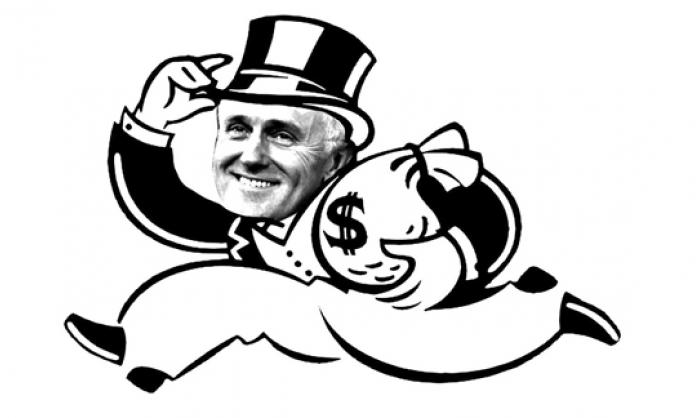Presenting his new ministry on 20 September, Malcolm Turnbull said, “If we want to remain a prosperous, first world economy with a generous social welfare safety net, we must be more competitive, we must be more productive, above all we must be more innovative”.
It’s become quite common for politicians to bang on about the “need to be competitive”, but Turnbull evidently intends this idea to be a hallmark of his prime ministership; it was the theme on which he concluded his announcement that he was challenging Abbott.
But consider what it means.
If Turnbull is right, and the only way to prosperity and social welfare for a country is to be more competitive than other countries, then it follows that there are always going to be countries that are poor and lacking in social welfare. No matter how hard they work, no matter how productive and innovative they become, some countries are going to go down the economic gurgler simply because somebody else has out-competed them. If every country in the world were to double or triple its productivity and innovation, some would still be prosperous and some impoverished.
Turnbull and the other worshippers of competition seldom or never talk about relevant specifics. For instance, how many countries in the world fall into the categories of winners and losers?
According to the available figures – not to mention what nearly everyone knows from just observing the world – the losers far outnumber the winners. The precise numbers vary slightly according to which statistics you use, but of the 180-plus countries in the world, only around one-sixth are winners – having per capita income of more than one-fourth of those at the top of the table.
Most of the poor countries have zero chance of becoming competitive on the world market. How much increase of productivity and innovation would be needed in Costa Rica or Lebanon or Turkey for those countries to double their per capita GDP twice as fast as the rest of the world? Even if they somehow succeeded in doing that over any time frame, they would still not be in the top one-sixth of countries.
Or, does anyone imagine that any amount of attention to Malcolm Turnbull’s values would enable Indonesia to match Australia’s per capita GDP (it is currently about one-seventeenth)?
Capitalist competition means the winners getting richer at the expense of the losers; anything else is not competition. This process has been going on for several centuries. One of its results is that those countries that are less competitive (for whatever reason, but often because winners looted them) lack the wealth that is a prerequisite for even keeping up with, let alone surpassing, productivity increases in the rich countries.
So when capitalists and their politicians talk about making Australia more competitive, the competitors they have in mind are nearly always countries that are similarly wealthy to us. (Exceptions include Gina Rinehart’s argument that Australian workers should be satisfied with the $2/day wages of workers in much of Africa.)
They know that competition normally tends to decrease the number of winners and increase the number of losers: the big fish eat the little fish. Australian capitalists are in no immediate danger of becoming little (uncompetitive) fish, but it pays to think ahead, and they also want to get their share, or more, of the little fish being gobbled up.
Unfortunately for Australian and other capitalists, innovation is not something you can order people to produce. It tends to thrive in situations of widespread access to open and unfettered education and research – that is, the kind of situations that both Liberal and Labor have been destroying for the past three decades. In Turnbull-speak, “innovation” is just window dressing.
What matters to capitalists is productivity: how much it costs them to produce something. Productivity can be improved by developing new technology, but that requires innovation and usually large investments. It’s much easier for capitalists to rely on cutting real wages.
Tony Abbott’s methods of doing that aroused too much opposition. Turnbull has been given the task of achieving the same goal in a fashion that minimises the resistance. If he doesn’t succeed, it will be Bill Shorten’s turn.
If we want a decent life for everyone, in Australia and internationally, we need a society based on cooperation and solidarity, not competition.









